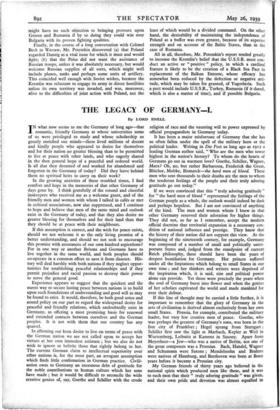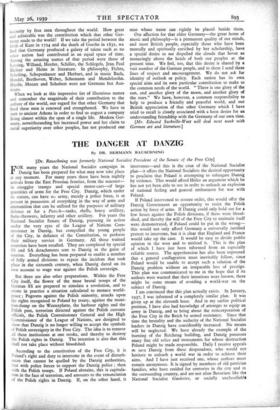THE LEGACY OF GERMANY -I.
By LORD SNELL
IN what now seems to me the Germany of long ago—that romantic, friendly Germany at whose universities some of us were privileged to study and whose scholarship so greatly enriched our minds—there lived millions of decent and kindly people who appeared to desire for themselves and for their nation no greater blessing than to be permitted to live at peace with other lands, and who eagerly shared in the then general hope of a peaceful and ordered world. Is all that they dreamed of and worked for abandoned and forgotten in the Germany of today? Did they leave behind them no spiritual heirs to carry on their work?
In the growing anxieties of these troubled times, I find comfort and hope in the memories of that other Germany of days gone by. I think gratefully of the rotund and cheerful innkeepers who received me as a welcome guest, and of the friendly men and women with whom I talked in cafés or met in cultural associations, now alas suppressed, and I continue to hope and believe that men of the same mind and outlook exist in the Germany of today, and that they also desire no greater blessing for themselves and for their land than that they should be at peace with their neighbours.
If this assumption is correct, and the wish for peace exists, should we not welcome it as the only living promise of a better understanding, and should we not seek to encourage this promise with assurances of our own kindred aspirations? For in one way or another Britons and Germans have to live together in the same world, and both peoples should co-operate in a common effort to save it from disaster. His- tory will deal harshly with both nations if they neglect oppor- tunities for establishing peaceful relationships and if they permit prejudice and racial passion to destroy their power to serve the general good.
Experience appears to suggest that the quickest and the surest way to secure lasting peace between nations is to build upon such foundations of understanding and good will as may be found to exist. It would, therefore, be both good sense and sound policy on our part to regard the widespread desire for peaceful and friendly relations, which undoubtedly exist in Germany, as offering a most promising basis for renewed and extended contacts between ourselves and the German peoples. It is not with them that our country has any quarrel.
In affirming our keen desire to live on terms of peace with the German nation we are not called upon to accept her virtues at her own immodest estimate ; but we also do not wish to ignore or belittle those that rightly belong to her. The current German claim to intellectual superiority over other nations is, for the most part, an arrogant assumption which finds little confirmation in German practice. Civili- sation owes to Germany an enormous debt of gratitude for the noble contributions to human culture which her sons have made ; but it would be difficult to reconcile the wide creative genius of, say, Goethe and Schiller with the crude religion of race and the vaunting will to power expressed by official propagandists in Germany today.
It has been a major misfortune of Germany that she has so often fallen under the spell of the military hero or the political leader. Writing in Die Post so long ago as 1912 a leading German author said, "Who are the men who tower highest in the nation's history? To whom do the hearts of Germans go out in warmest love? Goethe, Schiller, Wagner, Marx? Oh, no, but rather Barbarossa, Frederick the Great, Blucher, Moltke, Bismarck—the hard men of blood. These men who sent thousands to their deaths are the men to whom the tenderest feelings of the people and their truly adoring gratitude go out today."
If we were convinced that this "truly adoring gratitude" for "the hard men of blood" represented the feelings of the German people as a whole, the outlook would indeed be dark and perhaps hopeless. But I am not convinced of anything of the kind. The men and women whom I knew in that other Germany reserved their adoration for higher things. They did not, so far as I remember, accept the modern official doctrine that territorial expansion is a necessary con- dition of national influence and prestige. They knew that the history of their nation did not support this view. At the beginning of the nineteenth century, for example, Germany was composed of a number of small and politically unim- portant States and, judged from the standpoint of current Reich philosophy, these should have been the years of deepest humiliation for Germany. Her princes suffered under all the limitations which belong to small States in our own time ; and her thinkers and writers were deprived of the inspiration which, it is said, size and political power alone can provide. Yet those were precisely the years when the soul of Germany burst into flower and when the genius of her scholars captivated the world and made mankind for ever their debtor.
If this line of thought may be carried a little further, it is important to remember that the glory of Germany in the arts of civilisation is derived almost exclusively from her own small States. Prussia, for example, contributed the military leader, but very few creative men of peace. Goethe, who was perhaps the greatest of Germany's sons, was born in the free city of Frankfort ; Hegel sprang from Stuttgart ; Schiller first saw the light at Marbach, Kepler at Weil in Wurtemberg, Leibnitz at Kamenz in Saxony. Apart from Meyerbeer—a Jew—who was a native of Berlin, not one of the great composers was a Prussian. Bach, Handel, Wagner and Schumann were Saxons ; Mendelssohn and Brahms were natives of Hamburg, and Beethoven was born at Bonn years before it became a Prussian city.
My German friends of thirty years ago believed in the national spirit which produced men like these, and it was to such men that their" truly adoring gratitude" was given, and their own pride and devotion was almost equalled in intensity by free men throughout the world. How great and admirable was the contribution which that other Ger- many made to the world! If we take the period between the birth of Kant in 1724 and the death of Goethe in 1832, we find that Germany produced a galaxy of talent such as no other nation had contributed in an equal space of time. Among the amazing names of that period were those of Lessing, Willand, Herder, Schiller, the Schlegels, Jean Paul Richter and Heine in literature. In philosophy, Fichte, Schelling, Schopenhauer and Herbart, and in music Bach, Handel, Beethoven, Weber, Schumann and Mendelssohn. Haydn, Mozart and Schubert were not Germans but Aus- trians.
When we look at this impressive list of illustrious names and remember the magnitude of their contribution to the culture of the world, our regard for that other Germany that bred these men is renewed and strengthened. We have to turn to ancient Athens in order to find so august a company living almost within the span of a single life. Modern Ger- many, notwithstanding her increased power and her claim to racial superiority over other peoples, has not produced one man whose name can rightly be placed beside them.
Our affection for that older Germany—the great home of music and philosophy—is a permanent quality of our minds, and most British people, especially those who have been mentally and spiritually enriched by her scholarship, have a special desire to see dispelled the clouds that hover so menacingly above the heads of both our peoples at the present time. We feel, too, that this desire is shared by a vast number of the German people, and to them I send these lines of respect and encouragement. We do not ask for identity of outlook or policy. Each nation has its own special aims and its own particular contribution to make to the common needs of the world. "There is one glory of the sun, and another glory of the moon, and another glory of the stars." We have, however, a common responsibility to help to produce a friendly and peaceful world, and our British appreciation of that other Germany which I have tried to recall is closely associated with a keen desire for an understanding friendship with the Germany of our own time.
[Mr. Edward Sackville-West will deal next week with German art and literature.]



























































 Previous page
Previous page